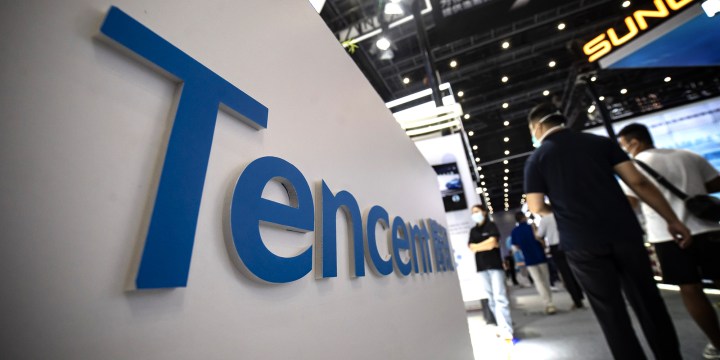AFTER THE BELL
Is the China-induced derating of Naspers/Prosus now baked in?

For South African stock market investors, there is only one really thumping question at the moment: Has the market now incorporated all the Naspers downside, or is there further to go?
The Naspers/Prosus duo dropped by a whopping 16% on Monday. For the largest company on the JSE to fall that much in a single day means we need some answers and we need them chop-chop.
The JSE is a huge entity compared to the size of the SA economy, but because the SA economy is equivalent to a rounding error in global terms, the JSE is not by any means a major global player. Consequently, it’s easy for the market to be dominated by a few players, or a single, large one. For years, that large player was Anglo American, which at one stage controlled about 40% of the exchange.
In recent years, the dominant force has been Prosus/Naspers, which is currently worth about 15% of the total value of all the companies on the exchange. The difference, of course, is that Prosus/Naspers is not really a function of the national economy, nor even of the global economy. It is a function of the Chinese economy, and that link is the proximate cause of its spanking on Monday.
For years now, the Naspers/Prosus management has tried every trick in the book to delink the connection between their company and the fortunes of the Chinese company Tencent, in which it has a stake of around 30%. Until very recently, whatever convoluted structure management came up with made absolutely no difference — the Naspers/Prosus share moved in lockstep with that of Tencent.
Then in June, the Naspers/Prosus management came up with a fabulous new idea, which nobody had come up with before: Why not just sell down the stake in Tencent? Genius! (Okay, okay — laying on the sarcasm a bit thick here.) Of course, this was what the market had been suggesting for years, but the Naspers management was reluctant, partly because the fortuitous investment in Tencent — now one of China’s largest companies — all those years ago put the company on the map internationally. Cutting the umbilical cord to the goose that laid the golden eggs is, I imagine, a pretty hard thing to do.
In any case, the revolutionary idea of selling down the Tencent stake instantly rerated Prosus, now the primary holder of that stake. In all fairness, there has been much criticism of the Naspers management over the years, but this year, they have actually served shareholders well. Prosus is down by 35% this year, which seems pretty bad. But Tencent is down by 65%.
Visit Daily Maverick’s home page for more news, analysis and investigations
Of course, there are many Silicon Valley companies down by that much or more over the past year. Hello, Facebook. But Tencent is China’s largest listed stock — or at least it was, until, get this, it was overtaken by a booze company. Now if that doesn’t tell you something, what does? Investors expect much less buying of stuff and a lot more drinking of high alcohol-content booze.
The latest cause of Tencent’s decline is the outcome of the Chinese Communist Party conference, in which the carefully curated balance between factions of the party was jettisoned and hardliners took control. You might have guessed that most people, at least most market watchers, knew this was going to happen. But clearly not, since the entire Chinese stock market got absolutely smashed. I cannot recall any purely political event having such an emphatic effect on the markets so quickly.
So here we stand, having to ask ourselves whether this decline is the full extent of the problem or just the start of a longer period of decay. You have to say the international commentary, even from people who have always been very pro-China, is sobering. One good example is former Goldman fund manager Jim O’Neill, whose BRICS analysis seemed so prescient when he and his colleagues conceived of it in the 90s. O’Neill estimated then that China would become larger than the US as an economy in real terms in 2027. He reaffirmed that belief just four years ago.
Now, on current growth metrics, it seems more likely that not only is this target wildly optimistic, but it may never happen! O’Neill now cites a US study that suggests as its main scenario, that China may well still overtake the US, but only at the end of the century. The alternative scenario is that the country which will first overtake the US will not be China, but India. Ah, life does throw those curveballs.
But back to the original question: Is Tencent’s decline now priced in? I don’t think so. It’s true that Tencent’s valuation is approaching value-stock territory, but it is still valued much higher on a price/earnings basis than its main Chinese competitor, Alibaba. To compensate for its fraying relations with the developed world, the Chinese government’s strategy was to push the economy toward local consumption. But the latest Chinese GDP figures, held back in true authoritarian government fashion till after the congress, show consumption is down again, with retail sales rising weakly by 2.5%.
In his take on the latest Chinese development, O’Neill says that in recent discussions with Chinese authorities, he has commented jokingly that he may be forced to admit that his 30 years of “understanding” China were a fluke, because he can now no longer comprehend some policies the country had adopted in recent years. That is not going to change any time soon, so all the dangers are probably on the downside. DM/BM



















More like “burnt out” than “baked in”!